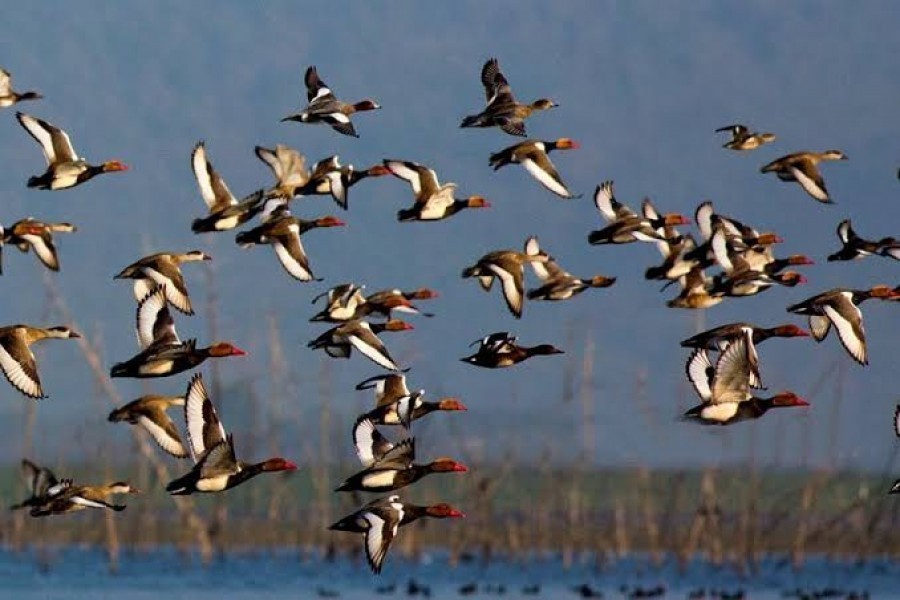
Published :
Updated :

In the first week of every November, 30-35 years ago, migratory birds would be seen arriving in Bangladesh in flocks. The sprawling water bodies in the rural areas, on city suburbs and the other water-dominated areas remained filled with the wing-flapping of these seasonal birds. Their clamorous chirping, the noise created by their quarrel would tell people in the nearby villages that the birds have started arriving. In those days, a large numbers of the birds would stay in Bangladesh for at least three months. Many of them would be seen basking in the relative warmth of the temperate land until April. All of them used to arrive in the country to escape the severe cold in their home-countries. Those included the cold and blizzard-swept regions in Europe, its northern part in particular, and the Himalayan belt. Except for professional bird-catchers or hunters, the people in droves from the urban and suburban areas would visit the sites just to watch birds.
With the continued drop in the number of migratory birds, the bird watchers have also undergone a noticeable decline. There are few potential reasons for the avian guests' arrival to undergo a drop on this scale. Experts in global bird migration blame many factors for this decline in the birds' winter migration to Bangladesh. They begin with the indiscriminate killing and catching of overseas birds by the poachers. They include both professional and amateur hunters. Selling of birds, hauled up by setting traps, in the city streets has been a regular sight not long ago. After a series of outcry by bird-lovers and environmentalists in consecutive years, the government was compelled to enforce a ban on wild bird catching. The newly enacted law kept provisions for severe punishment for the law breakers. Similar prohibitory laws are in force in the US and many other countries. It's because, wide-scale poaching of birds directly intervenes in a country's environmental equilibrium --- which leads, in the long term, to biodiversity losses. Keeping this concern in consideration, the US law prohibiting bird poaching attaches special importance to the safety of its wildlife resources. The Migratory Bird Treaty Act is such a law. Bird hunting has never been easy in the US. In the distant past, bird hunters in the vast country used to require 'special coupons' while on bird poaching expeditions.
The present US anti-bird poaching law makes illegal "by any means or in manner" to hunt, take, capture or kill birds, (or destroy nests or eggs) from listed species without a permit. The present Biden administration has made the law stricter --- by including migratory birds killed accidentally. To speak forthrightly, the US administration has made all kinds of harm done to birds illegal. Given the rise in the incidents of oil spills in the recent times, like that in Alaska, the US administration has put in all-out efforts to stop the menace of harms done to birds. It needs to be mentioned that hundred of marine birds have borne the brunt of accidental oil spillage from oil tankers elsewhere in the world. Notable of them are the Gulf of Mexico, Nigeria, Thailand etc.
The case of Bangladesh is rather different; and primitive too. Hundreds of years ago, ancient communities living on bird hunting were common in the deltaic yet forest covered land. Winter-time migratory birds would fly in to Bengal and the adjoining lands during also those days to flee the biting cold in their native habitats. The vast numbers of birds used to outnumber the land's own avian species. The migratory birds to the early inhabitants of Bengal were like holy guests from unknown lands. Their mindless killing began only in the last century. The age-old profession of bird-hunting and the community related to it had long gone extinct by that time. Hunting of birds, including the migratory ones, eventually became a gory fun around the 'haors', 'beels' and the other water bodies. The birds' killing spree became a winter festivity of sorts. With a prohibitory law yet to be in place then, poaching of migratory birds became a regular norm.
Bangladesh didn't take long before enacting its own bird protection law. According to its Wildlife Conservation and Security Act, "Hunting and killing of migratory birds is punishable offence. The law prohibits the killing of these guest birds, who visit Bangladesh for its warmer climate." The law and its application in the country's large cities notwithstanding, the scourge is yet to be wiped out fully. Reports of clashes between syndicates of poachers and local environmental activists continue to take place. The total scenario is dismal, with the poaching community getting reorganised and overpowering the conservationists. Meanwhile, water bodies of the country are being encroached upon to turn them into pieces of higher lands. As feared, it makes the cold-stricken, exhausted birds flying thousands of miles puzzled. In their attempts to frantically search for safe shelters they become confused. The birds get isolated from each other. Poachers look for it. With the approach of warmer days, many birds assemble in small groups in attempts to fly back home. The avian guides, meanwhile, go astray or get lost forever. Few of these birds can reach home safely.
The global warming and the drastic changes in seasonal and climate behaviours are adding to the woes of the migratory birds. The tropical summers and monsoons have changed their patterns of arrival, adding to the ordeals of these birds. Despite being focused on carbon emission cuts, the ongoing Oct 31-Nov 12 COP26 can leave a small space for the endangered migratory birds. They have also the right to a safe life.
shihabskr@ymail.com


 For all latest news, follow The Financial Express Google News channel.
For all latest news, follow The Financial Express Google News channel.